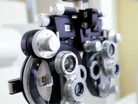World's First Flying Hospital Takes To The Skies

In a world first, eye care company ORBIS International has teamed up with telecommunications company Crestron, to equip and MD-10 aircraft with a variety of telecommunications and mHealth services. The aim of the aircraft is to provide eye care to the developing world.
The aircraft, donated by FedEx, will be equipped with an operating theatre, laser treatment room, communications center, recovery room, audio-visual/IT room and a 46-seat classroom.
“Crestron’s audio/video solutions will serve as an invaluable advantage in ORBIS’ mission to continue to save sight worldwide. ORBIS is fortunate to receive their full support as we build our new training facility,” said Jack McHale, Director of the MD-10 Project. “Crestron’s generous donation and state-of-the-art control and automation systems will help us continue to provide the gift of sight to people around the globe.”
Creston’s technology will not only be used by doctors on board the plane, but will also enable them to collaborate in real-time with specialists all over the world. Doctors will be able to attend lectures and join discussions remotely from anywhere in the world.
In addition, surgical procedures performed on the plane can be broadcast, with two-way communication technology and remote toggling so that healthcare professionals in other locations can move the cameras around to get better views.
The ‘teaching facility with wings’ is of special interest to Crestron's CEO, George Feldstein, an aviation enthusiast who founded the Crestron Eagles Program to donate telecommunications technology to military hospitals serving wounded veterans from Iraq and Afghanistan.

FedEx has donated the aircraft for ORBIS' eye hospital
“ORBIS is providing quality eye care to an underserved population,” Feldstein said. “Our complete solution will facilitate communication and collaboration between doctors, nurses and technicians to administer care in ways that were previously unimaginable. We look forward to helping ORBIS extend the value of its training programs and transform the lives of thousands around the world.”
This innovative project could be the first of many mobile hospitals and could change the healthcare industry for good.
Read Related Articles On Healthcare Global
